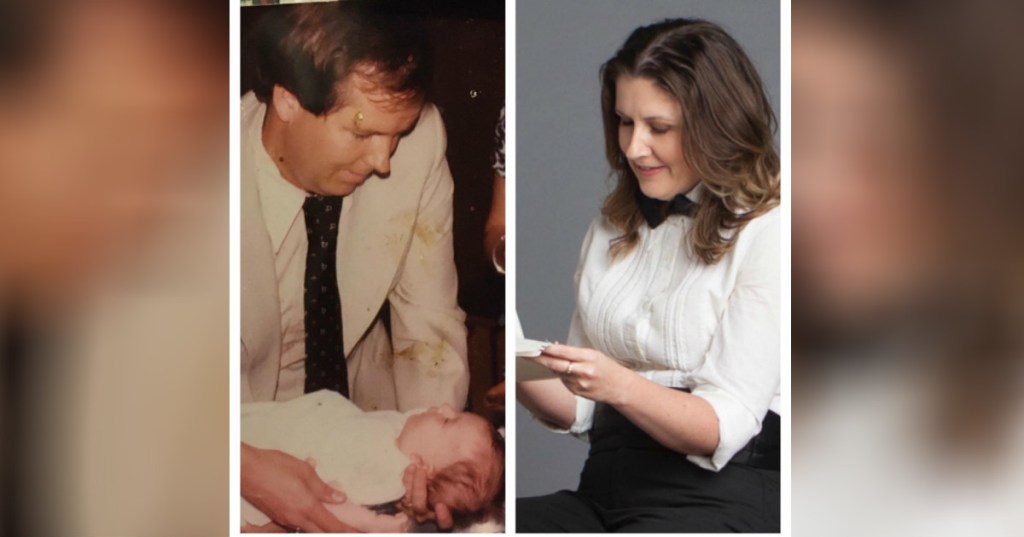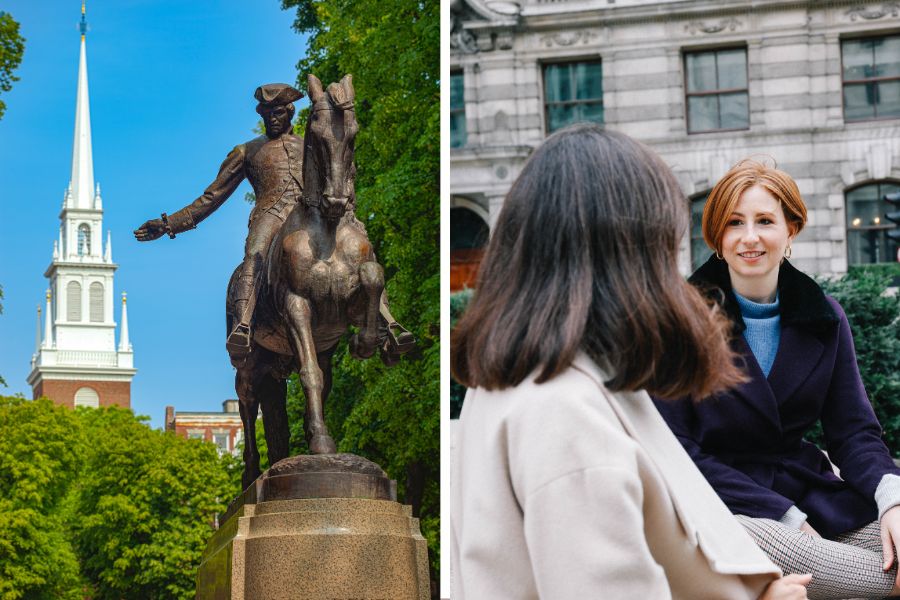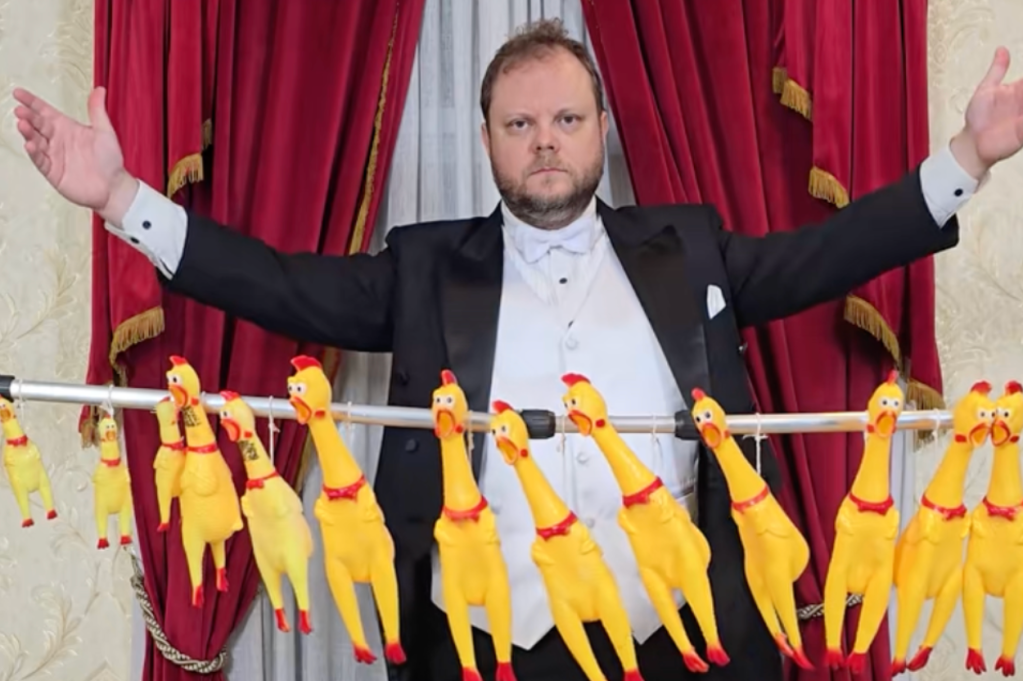The classrooms were empty.
Never did I expect to see my former high school, in Delaware, as the site of the Democratic National Convention on TV, but there it was. There was my study hall and my study hall teacher, who also happens to be the former second lady.
When I graduated college in Delaware, I hightailed it out of there, like most people my age. I had big dreams in New York. I wanted to be a writer.
That summer, my father was killed by a distracted driver. She’d gotten lost and pulled off a highway, picking up her phone at a red light to call for directions. She zoomed right through the next red and plowed into my dad, who was turning left. He died instantly. Or so I was told. I was 25, and decided to keep going. I inherited a small insurance settlement. I used it to stay in New York. It was how my dad would have wanted it, I thought.
Now, seventeen years later, those dreams had come true. I’d been published in national magazines and newspapers in addition to copyediting national magazines. But I still wasn’t fulfilled. No amount of career success could erase what had happened. I was still working on making it right.
“After our son Beau died of cancer, I wondered if I would ever smile or feel joy again,” the blond woman in the green shirtdress, Dr. Jill Biden, said on television. “It was summer, but there was no warmth left for me. Four days after Beau’s funeral, I watched Joe shave and put on his suit. I saw him steel himself in the mirror, take a breath, put his shoulders back and walk out into a world empty of our son. He went back to work. That’s just who he is. There are times when I couldn’t even imagine how he did it. How he put one foot in front of the other and kept going. But I’ve always understood why he did it…he does it for you. Joe’s purpose has always driven him forward. His strength of will is unstoppable, and his faith is unshakable. Because it’s not in politicians or political parties or even in himself — it’s in the providence of God.”
A week after Donald Trump was elected president in 2016, my life took an unexpected turn, too.
My brother had just moved into his first condo. My husband and I drove the four hours up to Salem, Massachusetts, to see him. Once there, my brother and future sister-in-law revealed a treasure they’d discovered in their move: our father’s bucket list.
“Talk with the President.” “Correspond with the Pope.” “Surf in the Pacific.” It was the kind of thing you find and chuckle over. His indecipherable handwriting, the wild things this man from Delaware wanted to do. But I didn’t just laugh. I felt a pull to action. My husband felt it too.
“You have to finish this list,” he said. “And then write a book about it.”
I’d been an activist for three years, twisting my work as a journalist into a platform. But I hadn’t found the right medium. And the numbers of car fatalities kept going up.
“The burdens we carry are heavy, and we need someone with strong shoulders,” Dr. Biden continued. “I know that if we entrust this nation to Joe, he will do for your family what he did for ours. Bring us together and make us whole, carry us forward in our time of need, keep the promise of America for all of us.”
It’s not easy. Moving on, trying to make sense of unimaginable tragedy.
I’ve understood what families have gone through the past six months. I know the pain of getting a phone call to learn your father has died. There is a helplessness. An anger.
My dad never would have wanted me to talk about his death my whole life. My dad was hopeful, joyful, a storyteller. He would have wanted a better story.
“Be invited to a political convention” was item 53 on my dad’s bucket list. After “talk with the President,” it struck me as the least feasible. But in August 2019, I gave it a go. By then I’d checked off 27 of my dad’s dreams.
First I wrote to every Democratic candidate. Then I wrote to every college alum who worked for the press, to every TV show who’d interviewed me. Finally, I tried a University of Delaware alum who worked at the local paper. He said he had no connection to Biden, but could put me in touch with the Delaware Democratic state party.
The Delaware Democratic chairman was kind. He said if I was a registered Democrat, I could attend their next convention.
That sounded like an invitation to me.
I walked out of the New York skyscraper where I worked and just before I reached the subway stopped and cried. Of all the conventions I could have ended up going to, I’d never imagined one in my home state. The place I’d wanted nothing to do with 20 years ago. But it was exactly where my dad would have gone, had he checked this off himself.
A few months later, a story about my mission to finish my dad’s list was published in my college’s alumni magazine. It was to come out that spring.

But by then, the whole world had fallen apart.
My husband came home from work early on a Wednesday in March. “I’m not going back,” he said. “We have to work from home indefinitely.”
We jumped in the car and drove to Whole Foods to stock up. I texted everyone I knew, asking them how they were handling this craziness. I got no response.
The pandemic hadn’t hit them yet.
“We just need leadership worthy of our nation,” Dr. Biden said. “Worthy of you. Honest leadership to bring us back together, to recover from this pandemic and prepare for whatever else is next. Leadership to reimagine what our nation will be.”
In the next few weeks, I decided I wanted more than just an invite to a state convention. And so as the country shut down, I collected signatures to become a national delegate. I had to do it digitally because my state was sheltering in place. I attached a photo of myself in a tuxedo (another list item, “own a black tux”). I asked my neighbors to put down whatever they were doing and please sign my list. But then the governor waived the need for signatures.
A councilwoman in my town emailed me. She said she could get me in. She shared my story with a friend who shared it with another friend and next thing I knew, the Joe Biden campaign was hearing about me.
Weeks went by. My University of Delaware magazine article came out. They’d put me on the cover. People said my story gave them hope during an uncertain time. But I felt lost. Yes, my story was one of hope, but hope in a more simple time. Not hope during a time of 170,000 deaths, 5 million Americans ill and millions out of work in only five months!
My husband and I couldn’t even leave our house. I couldn’t see anyone I loved. How on earth could my words still make a difference?
“How do you make a broken family whole?” Dr. Biden said. “The same way you make a nation whole: with love and understanding and with small acts of kindness. With bravery, with unwavering faith. We show up for each other in big ways and small ones again and again.”
The sacrifices I’ve seen people make for my dad’s bucket list have been countless. It has changed my marriage for the better, thanks to my husband’s contributions. Every sibling, cousin, aunt and uncle has chipped in, as have my mom and stepdad and every friend. Every person I know has somehow turned out to be an expert on some list item. They’ve given me their time for free. Even strangers.
I’m richer in love because of this project, I have friends I never would have known. And they tell me they’re richer too.
In June I learned Biden had chosen his NJ delegates for the national convention, and I wasn’t one of them.
But by July I felt better about not receiving an invite. Because now, thanks to the pandemic, nobody would. The convention would be virtual, in an effort to protect people’s lives.
Then it was announced that even Biden wouldn’t travel to Milwaukee. He’d accept the nomination right there in Delaware.
The same state I’d already been invited to for the Delaware state convention. My mom texted me an hour before the second night of the DNC.
“Jill Biden is speaking from her classroom at Brandywine High School, Room 232.”
“What?” I said. “I’ve been in that room!”
How is it possible? I thought. I’ve been denied an invitation back to my own high school!
But then I suddenly knew. It was because I was too busy trying to be important to remember who I really am.
“Now, Joe is not perfect,” former First Lady Michelle Obama said in her DNC speech. “And he’d be the first to tell you that. But there is no perfect candidate, no perfect president. And his ability to learn and grow—we find in that the kind of humility and maturity that so many of us yearn for right now. Because Joe Biden has served this nation his entire life without ever losing sight of who he is; but more than that, he has never lost sight of who we are, all of us.
Here she was, Dr. Jill Biden, this beautiful stateswoman, addressing our nation in a hopeless time, during the most important election of our lifetimes—from my high school. From little Delaware.
From a place that maybe wasn’t so little after all.
Maybe I didn’t have to make my voice seem big to be heard. Instead of spending the evening in a crowded arena, I spent it on my couch at home, cheering with my mom over the phone when we saw my old stomping grounds on TV.
And hers were the only ears I needed. The only invitation I could want.
A night with my mom at the national convention. And I know my dad was there, too.
Probably laughing at me.
Laura Carney is a writer and magazine and book copy editor in New York and is writing a book about finishing the bucket list of her late father, who was killed by a distracted driver























